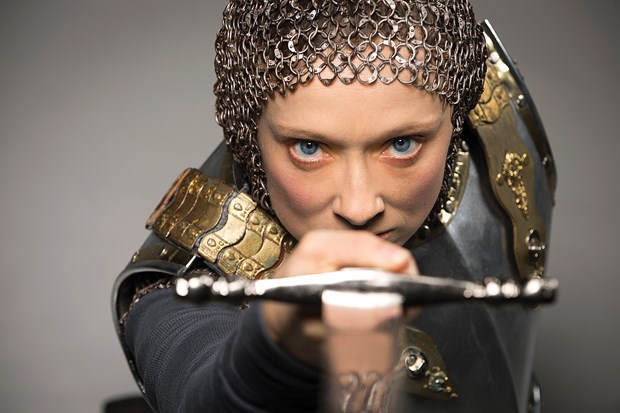Arts Club Theatre Company presents Saint Joan by George Bernard Shaw, until Nov. 23 at the Stanley Industrial Alliance Stage, 2750 Granville St., Vancouver. Tickets from $29 at artsclub.com or 604-687-1644.
Ever since she was a child and her father introduced her to Irish playwright George Bernard Shaw and his 1924 work Saint Joan, Meg Roe has had her sights set on the role of Joan of Arc.
"It's sort of one of those roles that you're meant to play if you think you're an actress," says the actor/director.
Published just four years after Joan of Arc was canonized, Shaw's play dramatizes the life and trial of the pious peasant girl who claimed that voices and visions from God commanded her to rally the French army and lead the troops to victory against the English in the Hundred Years War. Ultimately, though, she was captured by the English, put on trial for heresy and burnt at the stake.
Fulfilling a lifelong acting ambition, Roe is taking on the part of the legendary "Maid of Orleans" in the Arts Club Theatre Company production of Saint Joan, directed by Kim Collier. It's been more than 500 years since the controversial trial that condemned Joan of Arc to death, and yet she remains a heroine in France and a popular figure in literature, art and pop culture. Roe isn't surprised that the legacy of this 15th century martyr has endured the ages.
"It's her fierce determination to stick to what she believed in against all odds. She's one of the best-recorded medieval female figures. We don't know that much about medieval women - no one wrote about them - but Joan was written about a lot," Roe says, noting that detailed records from the condemnation trial have survived the centuries. "She just had this incredible tenacity. She really stuck true to herself, which is just inspiring. I think that's why we still want to talk about her."
Shaw wrote Saint Joan during the aftermath of the First World War and many critics see the work as a commentary on the time. As a tragedy, it marked a departure from his body of work to that point.
"He was writing it in the context of the First World War and nationalism and the rise of nationalism and how those ideas were damaging or powerful," Roe says.
A year after Saint Joan was published, Shaw was awarded the Nobel Prize in Literature. Although his play was written with theatre-goers of the 1920s in mind, Roe expects the story will resonate with audiences today just as powerfully as it did then.
"People are getting up and fighting in the name of God all over the world. It's extremely frightening," she says of the modern era. "So I think the play speaks to us maybe in a different way than Shaw intended in some respects, but we hear ourselves in it still, I think. It rattles us."
Just a few days ago, Roe was reading a news article about a unit of Kurdish women fighting ISIS that made her question how much the public perception of females participating in war has changed since Joan of Arc's time.
"We're still titillated by and shocked by the idea that women might want to take up arms," she says.
Saint Joan marks Roe's return to acting after two and a half years off the stage and it's been a joy to perform again, she says.
"There's a great pleasure in that intimacy with the playwright, getting in their head and trying to determine what it was they wanted to say and how they wanted to say it."
But Joan of Arc is also an inherently challenging role - one that has presented Roe with tough questions about her character, about power and destiny that don't have black-and-white answers.
"I hope it's that way for the audience too. I think Shaw can be challenging because he asks big questions with lots of words. He wants you to listen and not just receive. He wants you to engage with him, with his ideas," she says. "But I think it's a pleasure when you find yourself understanding and following and enjoying what he's positing, what he's putting out there."
In any case, Roe believes Saint Joan is "a play for our time." It deals with violence, war, God, humanity, the self - "and how all those things combine to hopefully create a gentle and loving civilization, and how often they do not."



